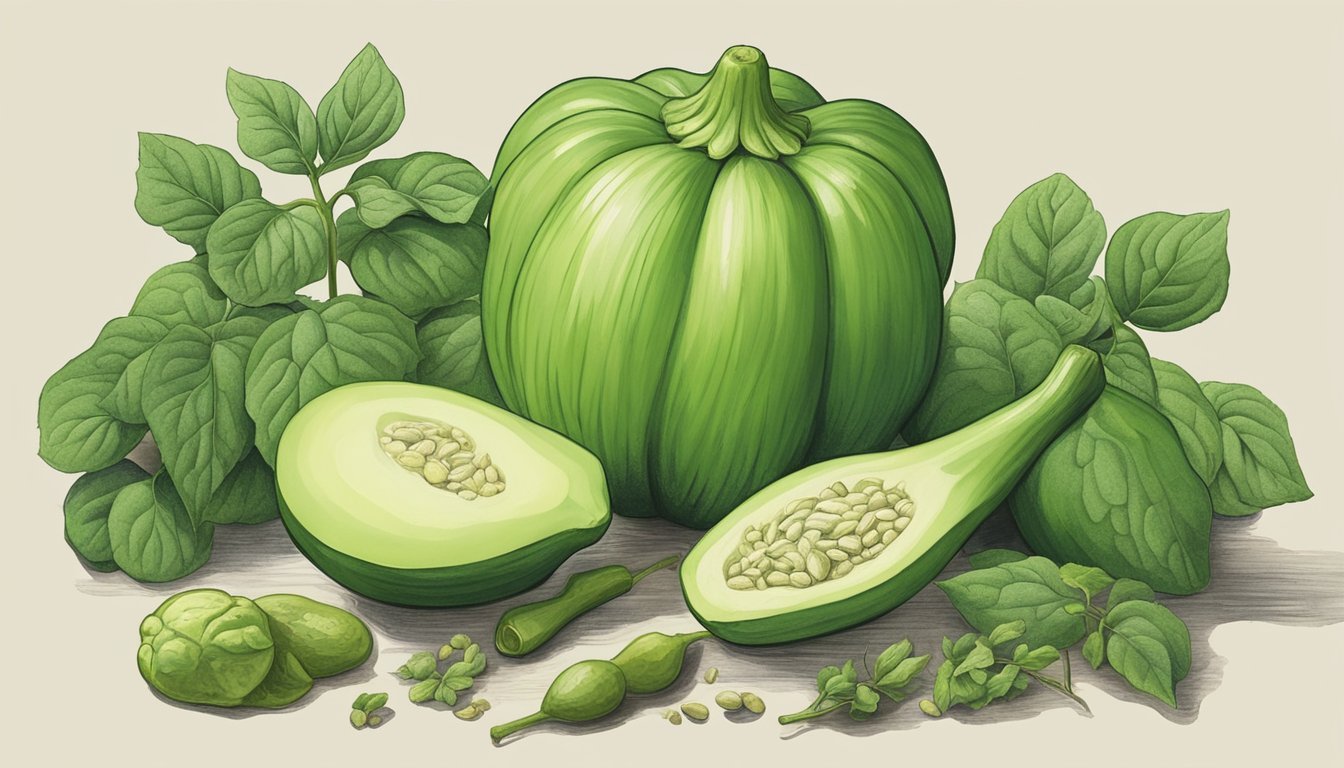What Are the Health Benefits of Chayote Squash?
Understanding Its Nutritional Impact
Chayote squash, also known scientifically as Sechium edule, is frequently consumed as a vegetable but is technically a fruit. It is renowned for its light green, wrinkled skin, and crisp texture. Globally, chayote is a staple in various cuisines for its mild flavor, which allows it to absorb the essence of the spices and ingredients it's cooked with. It is a versatile ingredient that can be eaten raw in salads, boiled, baked, or as part of a stir-fry dish.
On the nutritional front, chayote is a low-calorie food packed with a range of essential nutrients. It provides fiber, vitamins such as vitamin C and vitamin B9 (folate), and minerals including magnesium and potassium. These nutrients play a crucial role in maintaining overall health.
The health benefits of consuming chayote are diverse. Regular intake can contribute to antioxidant intake, which combats free radicals and may lower the risk of chronic diseases. It also offers benefits from the fiber content, which aids in digestion and may help in managing blood sugar levels. On top of these attributes, it contains compounds that have the potential to support cardiovascular health and might possess anti-inflammatory properties.
Nutritional Profile of Chayote Squash
Chayote squash is a nutrient-dense vegetable offering a rich array of vitamins, minerals, and dietary fiber, while being low in calories. This makes it an advantageous addition to a health-conscious diet.
Macronutrients and Calories
Chayote squash is low in calories yet provides essential macronutrients. On average, a 100-gram serving contains just 19 calories. This same serving size offers:
Protein: 0.82 grams
Fat: 0.13 grams
Carbohydrates: 4.51 grams
Though low in fat, chayote squash contributes modestly to the daily protein intake and offers mostly complex carbohydrates, making it an energy-stabilizing food.
Vitamins and Minerals
The vegetable is particularly rich in several vitamins and minerals essential for overall health. Here is a list of key nutrients found in a 100-gram serving of chayote:
Vitamin C: 7.7 mg
Vitamin B6: 0.045 mg
Folate (Vitamin B9): 93 μg
Vitamin K: 4.1 μg
Chayote also contains an impressive range of minerals:
Magnesium: 12 mg
Potassium: 125 mg
Manganese: 0.2 mg
Phosphorus: 18 mg
Calcium: 17 mg
Zinc: 0.34 mg
Iron: 0.34 mg
Copper: 0.076 mg
The presence of magnesium and potassium contributes to cardiovascular health, while folate is crucial for DNA synthesis and repair.
Fiber Content in Chayote
Dietary fiber is essential for digestive health, and chayote does not disappoint. It provides about 1.7 grams of fiber per 100 grams, contributing to the recommended daily intake of fiber. Adequate fiber promotes healthy bowel movements and helps maintain a healthy digestive tract.
Health Benefits of Chayote Squash
Chayote squash is a nutrient-dense fruit with a mild flavor that contributes to various health benefits ranging from improved heart health to blood sugar regulation.
Cardiovascular Health
Chayote squash contains vital nutrients that support heart health. It is an excellent source of potassium, a mineral essential for maintaining proper blood pressure levels. The fiber in chayote also helps to manage cholesterol levels, reducing the risk of cardiovascular disease.
Blood Sugar Regulation
The low glycemic index of chayote makes it beneficial for blood sugar control, which is particularly important for individuals managing type 2 diabetes. Its fiber content aids in slowing down the absorption of sugar in the bloodstream, thereby preventing spikes in blood sugar levels.
Digestive Health
As a fiber-rich food, chayote promotes healthy digestion and prevents constipation. The soluble fiber present in chayote squash can aid in maintaining a healthy gut by supporting the growth of beneficial bacteria.
Anti-Inflammatory Effects
Chayote squash exhibits anti-inflammatory properties due to its antioxidant content. These antioxidants help neutralize free radicals, potentially reducing inflammation and the risk of various chronic diseases.
Weight Management and Satiety
Incorporating chayote into the diet can aid in weight management and obesity prevention thanks to its low calorie and high fiber content, which can enhance the feeling of satiety. The soluble fiber in chayote can help contribute to a sense of fullness, discouraging overeating and aiding in weight loss efforts.
Culinary Uses of Chayote
Chayote squash, a versatile vegetable, finds its way into various culinary traditions, particularly within Mexican and Latin American cuisines. It is appreciated for its mild flavor which makes it suitable for a range of dishes, from refreshing salads to hearty soups.
Raw and Salad Applications
Chayote can be eaten raw and is often julienned or chopped to add a crisp texture to salads. Its subtle taste pairs well with citrusy dressings or more robust flavors like chili and garlic. In raw applications, the chayote is sometimes treated with a splash of lemon or lime juice to prevent discoloration and enhance flavor.
Common raw uses:
Julienned in salads
Sliced for crudité platters
Shredded in slaws
Cooking Techniques and Recipes
When cooked, chayote is tender yet retains a slight bite. It absorbs the flavors of the ingredients it's cooked with, making it perfect for soups, stews, and sautés. The flesh of chayote can be cubed or sliced and added to dishes such as stews or it can be stuffed and baked.
Cooking applications:
Soups: Chayote is diced and simmered in broth with other vegetables.
Stews: Chayote can be combined with meats and spices in traditional Latin American dishes.
Steamed: It may be served with a touch of butter or olive oil and seasonings.
Tea: The leaves of chayote are also used to brew a flavorful tea in some cultures.
In both raw and cooked forms, chayote is not just a nutritious addition to the diet, but its culinary flexibility makes it a beloved ingredient in kitchens across Mexico and Latin America.
Chayote in Traditional and Folk Medicine
In various cultures, chayote (Sechium edule), also known as vegetable pear, chocho, or mirliton, holds a significant place in traditional and folk medicine. This gourd family member, belonging to Cucurbitaceae, is revered not only for its culinary versatility but also for its potential medicinal properties.
Digestive Health: Traditional use of chayote embraces its fiber content, which is understood to promote a healthy digestive system. The high fiber content can help to alleviate constipation and maintain gut health.
Blood Sugar Regulation: Chayote has been used to support blood sugar control. Its components are believed to aid in the stabilization of blood sugar levels, making it a favorable option for those dealing with metabolic syndrome or trying to manage their dietary intake of sugars.
Anti-inflammatory Properties: The presence of quercetin, a powerful antioxidant found in chayote, is utilized in folk medicine due to its anti-inflammatory properties. Quercetin plays a role in supporting the body's immune function and may assist in preventing chronic diseases.
Kidney Support: Folk remedies also cite chayote as a supportive agent for kidney health, with some historical uses highlighting its role in reducing the likelihood of kidney stones formation.
It is essential to approach the claims of traditional and folk medicine with a discerning eye, acknowledging that while chayote has been associated with various health benefits, scientific evidence varies and more research is warranted. Those who are allergic or sensitive to members of the gourd family should proceed with caution. It is also wise to seek professional medical advice when using chayote as part of any medicinal regimen.
Frequently Asked Questions
In this section, readers will find answers to common inquiries about the health benefits of chayote squash, backed by nutritional evidence.
Can eating chayote contribute to weight management?
Chayote is low in calories and high in fiber, making it a favorable addition to diets focused on weight management. Its fiber content can promote satiety and reduce overall calorie intake.
What are the potential skin benefits of consuming chayote?
Rich in vitamin C and antioxidants, chayote may aid in skin health by enhancing collagen production and protecting against oxidative damage, which can help maintain skin elasticity and prevent signs of aging.
Is chayote consumption beneficial for kidney health?
Chayote contains essential nutrients such as potassium, which can support kidney function by maintaining fluid balance and helping in the elimination of waste products.
Does chayote have a role in maintaining stable blood sugar levels?
The fiber in chayote can slow the absorption of sugar into the bloodstream, contributing to more stable blood glucose levels and potentially benefiting individuals managing diabetes.
How might chayote be incorporated into a diet for managing high blood pressure?
With its low sodium and high potassium content, chayote can be part of a diet that may assist in managing high blood pressure, as potassium helps to lessen the effects of sodium and maintain proper blood vessel function.
Are there any medicinal properties associated with chayote leaves?
While the flesh of chayote is widely consumed, chayote leaves have been used in traditional medicine for their potential diuretic properties and may provide benefits when prepared as an herbal tea.




